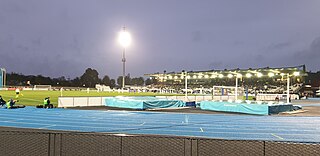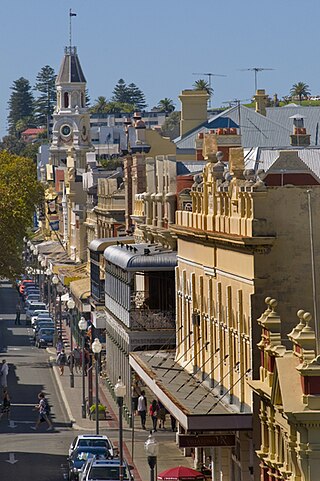
Fremantle is a port city in Western Australia, located at the mouth of the Swan River in the metropolitan area of Perth, the state capital. Fremantle Harbour serves as the port of Perth. The Western Australian vernacular diminutive for Fremantle is Freo. Fremantle was also ranked 7th place for "Top 10 tourism city for 2016". It was also featured in "TIME Magazine’s 50 Greatest Places of 2022". Making it one of the most popular tourist attractions in the country.

Albany is a port city in the Great Southern region in the Australian state of Western Australia, 418 kilometres (260 mi) southeast of Perth, the state capital. The city centre is at the northern edge of Princess Royal Harbour, which is a part of King George Sound. The central business district is bounded by Mount Clarence to the east and Mount Melville to the west. The city is in the local government area of the City of Albany. While it is the oldest colonial, although not European, settlement in Western Australia - predating Perth and Fremantle by over two years - it was a semi-exclave of New South Wales for over four years until it was made part of the Swan River Colony.

Subiaco is an inner-western suburb of Perth, the capital of Western Australia. It is approximately 3 km (1.9 mi) west of Perth's central business district, in the City of Subiaco local government area. Historically a working-class suburb containing a mixture of industrial and commercial land uses, since the 1990s the area has been one of Australia's most celebrated urban redevelopment projects. It remains a predominantly low-rise, urban village neighbourhood centred around Subiaco train station and Rokeby Road.

Fremantle Oval, also known by naming rights sponsorship as Fremantle Community Bank Oval, is a stadium in the centre of Fremantle, Western Australia, located on Parry Street. It currently has a capacity of 17,500 with terracing and a members area holding 750, though capacity was capped at 10,000 for Fremantle AFLW games. Fremantle Oval was originally used for cricket, but in 1895 hosted its first game of Australian rules football and Australian Football quickly became the main attraction leading to the development of the ground. It is located between the Fremantle Hospital, Fremantle Markets and the Fremantle Prison.

Arden Street Oval is a sports oval in North Melbourne, Victoria. It is currently the training base of the North Melbourne Football Club, an Australian rules football club, and up to the end of the 1985 season it was used as the team's home ground for Victorian Football League (VFL) matches.

Claremont Oval, also known by naming rights sponsorship as Revo Fitness Stadium, is an Australian rules football stadium located in Perth, Western Australia. The stadium, opened in 1905 as "Claremont Recreation Ground", seats 5,000. It is the home of the Claremont Football Club, an Australian rules football club that plays in the Western Australian Football League (WAFL), the state's premier Australian rules competition.

John James Clark, an Australian architect, was born in Liverpool, England. Clark's 30 years in public service, in combination with 33 in private practice, produced some of Australia's most notable public buildings, as well as at least one prominent building in New Zealand.

Fremantle Town Hall is a town hall located in the portside city of Fremantle, Western Australia, and situated on the corner of High, William and Adelaide Streets. The official opening, on 22 June 1887, coincided with the celebration of Queen Victoria's Jubilee and it was formally named by the mayor, Daniel Keen Congdon and the state governor, Frederick Broome, as the Town and Jubilee Hall.

Lakeside Stadium is an Australian sports arena in the South Melbourne suburb of Albert Park. Comprising an athletics track and soccer stadium, it currently serves as the home ground and administrative base for association football club South Melbourne FC, Athletics Victoria, Athletics Australia, Victorian Institute of Sport and Australian Little Athletics.

High Street is the main street running through the City of Fremantle, Western Australia. The street passes by historic landmarks, including the Round House, the Fremantle Town Hall, and the Fremantle War Memorial, through the Fremantle West End Heritage area and through two town squares. Trams operated along High Street for 47 years, between 1905 and 1952. Running east–west, High Street continues as Leach Highway, a major arterial road, at Stirling Highway, linking Fremantle with Perth Airport although the stretch of road between Stirling Highway and Carrington Street is known locally—and signed—as High Street.

Victoria Hall located on High Street, Fremantle designed by Talbot Hobbs was built between 1896 and 1897 as St John's Parish Hall, and renamed for the diamond jubilee of Queen Victoria in 1897. It was opened by Governor Smith and his wife on 28 September 1897.

The Adelec Buildings located at 28-36 High Street, on the corner of Henry Street in Fremantle, Western Australia. The heritage listed buildings were constructed in 1906 during the gold boom period by the trustees of Captain Edward Henry Fothergills estate.

Fowler's Warehouse, also known as the Fremantle Furniture Factory, was constructed in 1900 as the principal premises in Western Australia for D. & J. Fowler Ltd. Principally on Henry Street in Fremantle, the building extends through to Pakenham Street, and comprises offices, warehouse, engine room packing and coffee roasting house, stables and sheds. Local architect Frederick William Burwell designed the building. Burwell also designed the Central Chambers, Sail and Anchor Hotel, Victoria Pavilion, Owston's Buildings and Marmion House.

The Sail and Anchor Hotel is located on the corner of South Terrace and Henderson Street in Fremantle, Western Australia, opposite the Fremantle Markets.

George Klewitz Soward was an architect and politician in South Australia. he was a partner in the firm English & Soward from 1880 to 1925, renamed English, Soward & Jackman from 1926 to 1936. Among other buildings, the firm was known for designing Beehive Corner, the Epworth Building, and the Queen Adelaide Club.
Michael Francis Cavanagh was an Australian architect, primarily known for his work in Western Australia from 1895 to the late 1930s.
Peter John Wilson (1869–1918) was an Australian architect, known for a number of buildings in Western Australia.

The Fremantle Synagogue is a heritage listed building located on South Terrace on the corner of Parry Street in Fremantle, Western Australia. It was the first synagogue built in Western Australia and was associated with Jewish community leaders and merchants in Fremantle at the end of the 19th century. The building is also known as Beers building.

Central Chambers is a heritage listed building located at 61-63 High Street on the corner of Pakenham Street in Fremantle, Western Australia. It was one of many commercial buildings constructed in Fremantle during the gold boom period in the late nineteenth and early twentieth century.

Owston's Buildings, also known as Ouston's building, is a heritage listed building located at 9-23 High Street on the corner with Mouat Street in the Fremantle West End Heritage area. It was one of many buildings constructed in Fremantle during the gold boom period in the late nineteenth and early twentieth century.



















